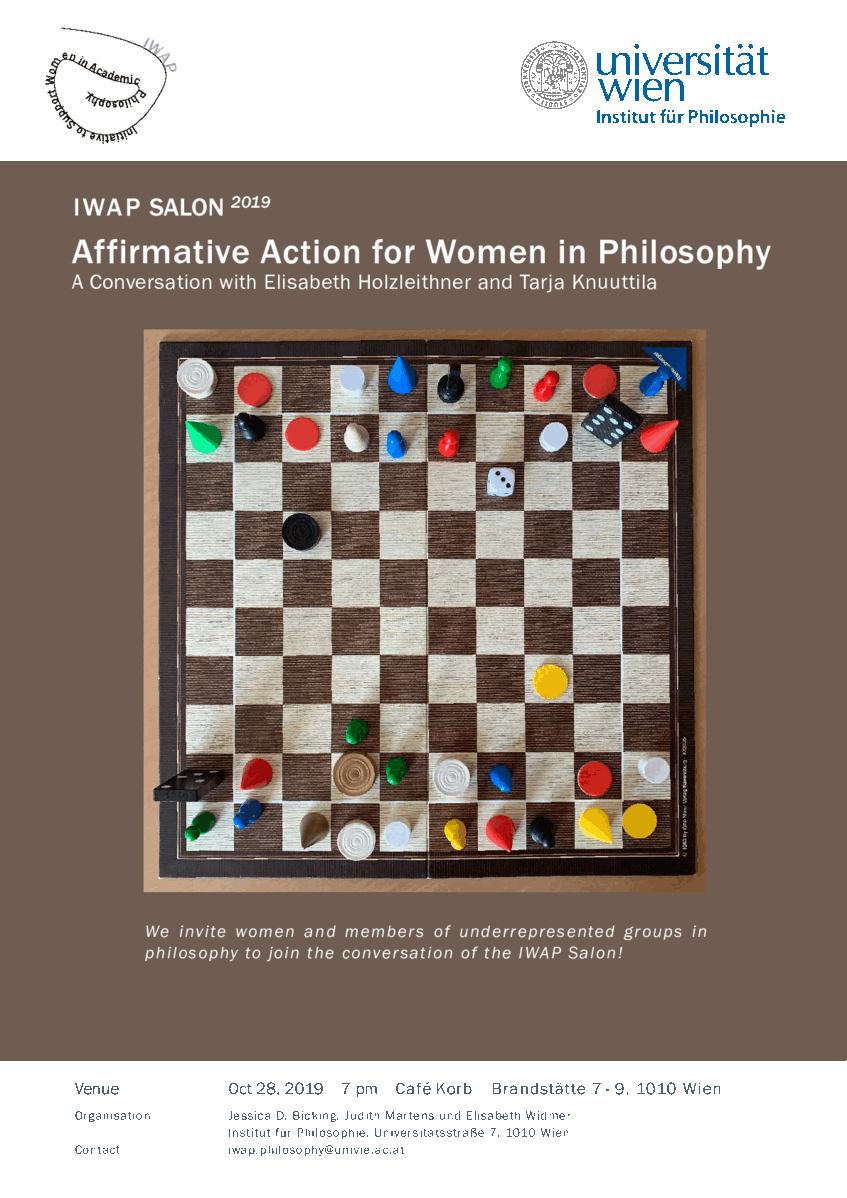Upcoming & Past Salons
The idea of the salon is to create an opportunity where we could meet our peers across the lines of academic niche and rank that divide us. In the salon, we hope to fashion a space where we can exchange and reflect on the more pragmatic side of being underrepresented in philosophy, share our experiences, learn from eachother and nurture a more close-knit network with those that face similar challenges in their academic day-to-day. Typically Café Korb delivers an informal setting where we invite experienced members of our community to join us for a drink and a conversation.
Below, some details on past & upcoming salons.
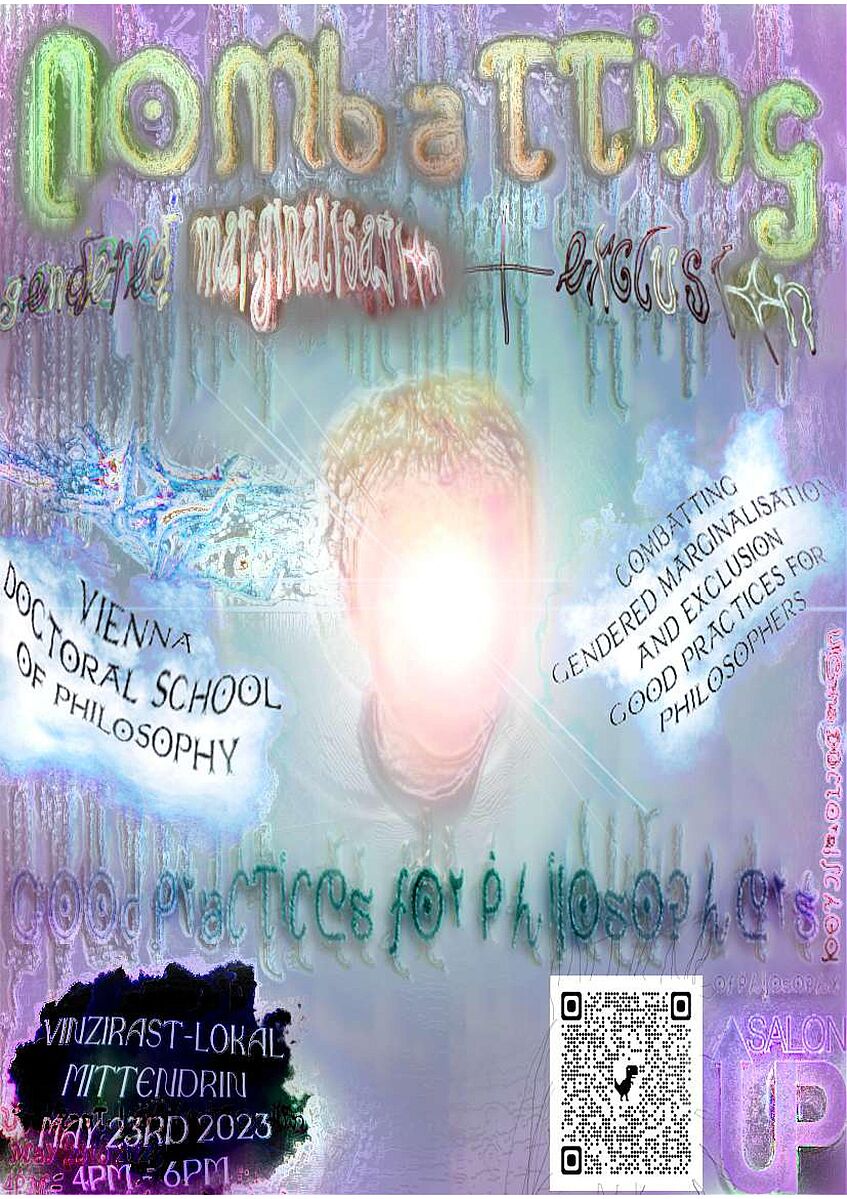
Combatting Gendered Marginalizations & Exclusions: Doing Philosophy Better
Workshop co-organized with the Vienna Doctoral School of Philosophy
Facilitated by Stephanie Deig (University of Lucerne)
When? Tuesday, May 23rd, 2023 - 4 to 6PM
Where? VinzRast-Lokal mittendrin, 1090 Wien
This workshop is open to persons of all genders working at all levels of the department. We especially invite people with extensive teaching experience to share their perspectives and experiences on gendered exclusions and bystanding in academic settings.
Please sign up to the workshop via the following link:
https://forms.gle/6Dw4oDWibNCWCRTX7
Note that we only have 20 open spots; we will allocate them via a “first come, first serve” system.
What?
The field of academic philosophy has a serious problem with the under-representation of women as well as persons, who do not identify with the gender assigned to them at birth. This is due to structural forms of gendered marginalization and exclusion that create unsafe and harmful environments. In the first part of this workshop, participants will be introduced to how specific mechanisms, such as implicit bias, stereotype threat, as well as sexual and moral harassment manifest within philosophical settings: working, teaching, and learning, and how transforming certain conditions and practices could help combat them. In the second half of the workshop, participants will be given a theoretical introduction to bystander interventions and be encouraged (but not required) and given space to share their own experiences relevant to these questions to create awareness and discuss potential strategies that could be enacted locally. We will conclude by using these experiences as a basis for discussion about how bystanders can safely and productively intervene in instances of gendered wrongdoings. Even though the workshop focuses on gender-based exclusions, the convener seeks to create a space for discussing marginalization from an intersectional perspective.
If you have a topic that you’d particularly like to discuss or are interested in contributing to the workshop, please contact Stephanie Deig at: stephanie.deig@unilu.ch
Stephanie Deig, MA, is a PhD Candidate at the University of Lucerne. She is a co-founder of two organizations that have worked to combat gendered inequalities in the academic field of philosophy in Switzerland and is active as a board member with The Society for Women* in Philosophy Switzerland."
Here you can find the link to the Good Practice Guide that Stephanie bases the presentation on (it is in DE and EN): https://www.swipswitzerland.org/good-practice-guide
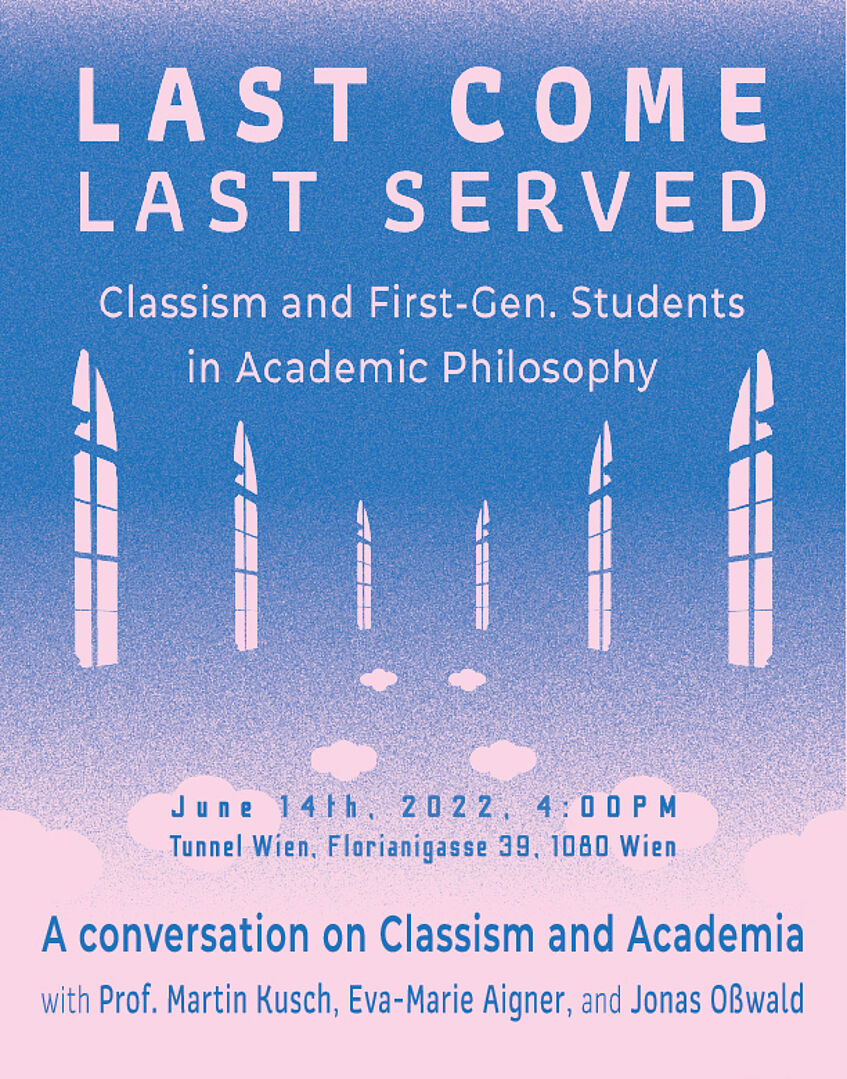
UPsalon #4:
Last come, last served - Classism and First-Gen. Students in Academic Philosophy
A conversation with Eva-Maria Aigner, Jonas Oßwald & Martin Kusch.
When? Tuesday, June 14, 2022 - 4 to 5.30PM
Where? Café Tunnel, Florianigasse 39, 1080
What?
With this upcoming event we seek to address the seldomly discussed and often invisible classism encountered at academic institutions by students and academics from working-class families - those who are low-income or the first in their families to attend and attain higher education. Studies have shown that there are persistent social class achievement gaps that cannot be explained away solely pointing at differing academic preparation or resources. Rather than finding deficiencies with the students, there is a need to speak about the academic environment that just seems not set up for them.
In conversation with Prof. Martin Kusch as well as lecturers Eva-Marie Aigner and Jonas Oßwald, combining theoretical input and personal experiences, we hope to explore and lay bare some of the unseen and compounding obstacles on the road to upward social mobility.
Join us for drinks and in our discussion on:
- cultural mismatch between home & academia
- financial instability and precarity in academia
- combining work and study
- an international comparison of classism & social mobility in academia
- coping strategies and building support for first-gen. scholars
Preliminary Program
4.00PM - WELCOME
4.20PM - BRIEF THEORETICAL INTRO TO CLASSISM & ACADEMIA by Eva-Maria Aigner and Jonas Oßwald
4.40PM - ------ Short Break ------
4.50PM - OPEN CONVERSATION with Martin Kusch, Eva-Maria Aigner and Jonas Oßwald
The evening is open end, and all participants and contributors are welcome to stay and continue the conversation over dinner & drinks!
Everybody is welcome; but since we only have 25 slots available, we would like to ask you to register via our eventbrite page.
Looking forward to meeting you there!
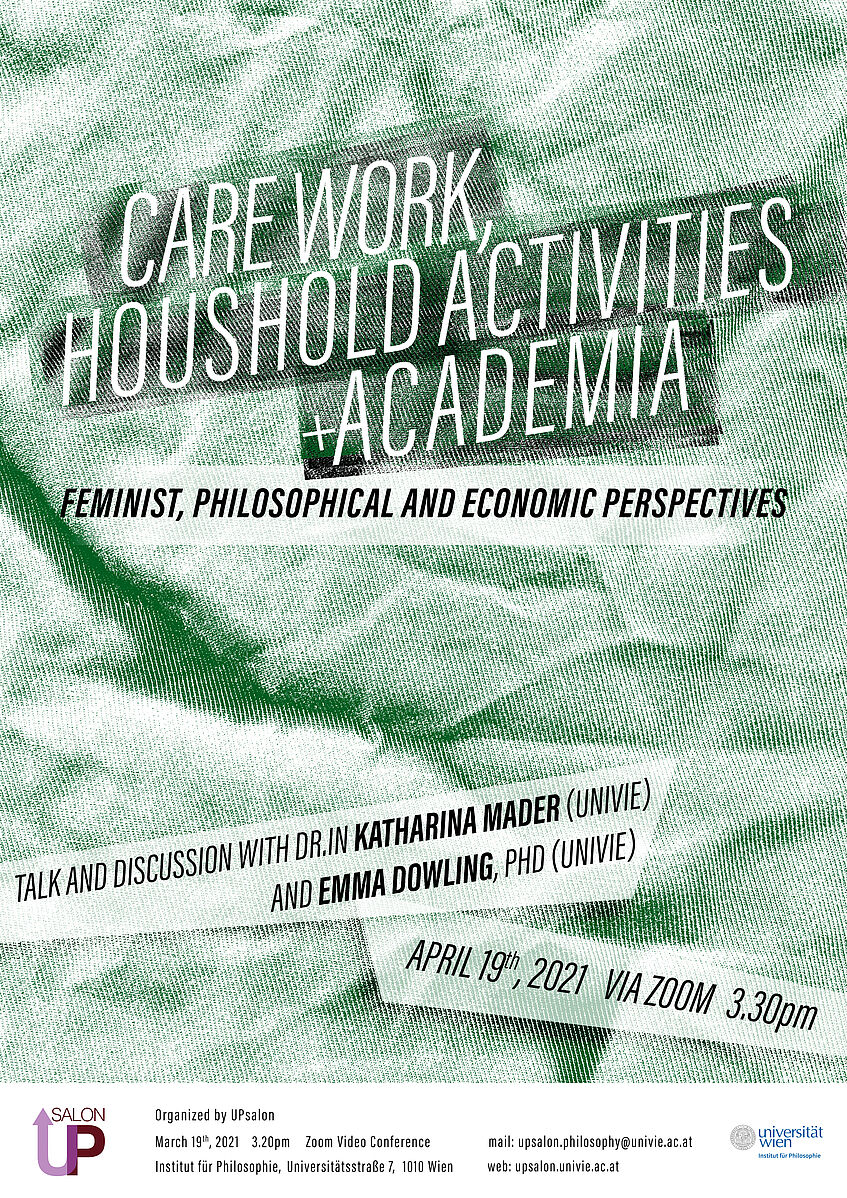
UPsalon #3:
Care Work, Household Activities and Academia - Feminist, philosophical and economic perspectives
With Emma Dowling and Katharina Mader
When? Monday, April 19, 2021 - 4:30 to 6:30PM (CEST)
Where? ONLINE SALON
What?
In May 2020, The Guardian posted an article about female academics and the childcare and household related obstacles they faced during the first wave of the coronavirus induced lockdown. Elizabeth Hannon, deputy editor of the British Journal for Philosophy of Science, had noticed that the number of article submissions she was receiving from women had dropped dramatically. She posted about it on Twitter and seemed to have hit a nerve. Many female academics testified that they were barely coping with childcare, looking after older family members, an increase of household chores and academic work during lockdown. Research and writing articles, key components to being successful in academic careers, fell back behind teaching, childcare and household duties.
In this regard, the ongoing pandemic the world is facing is fairly revelatory. It uncovers several areas of social injustice, e.g., poor and inhumane working conditions or the lack of access to universal health care. Additionally, the current situation indicates that stereotypical gender norms concerning care work and household activities still disadvantage women in many work environments and especially so in academia.
With this event, we want to take a closer look at the ways in which female academics are burdened with care work and family duties to a greater proportion. Additionally, we want to explore the reconcilability of academia and family planning in general. (Note that the conception of “family” in this context does not only encompass the heteronormative concept of the nuclear family but is meant to include all forms of intimate and domestic relations.) Our goal is to provide both philosophical, economical and feminist perspectives as well as empirical data on the topics of care work, household activities, family planning and academia.
The link will be shared in due time over the university mailinglists.
If you are not on those mailinglists, please register your interest with an e-mail at upsalon.philosophy@univie.ac.at.
Everybody is welcome!
Rules of Conduct for Online Salons [here]!
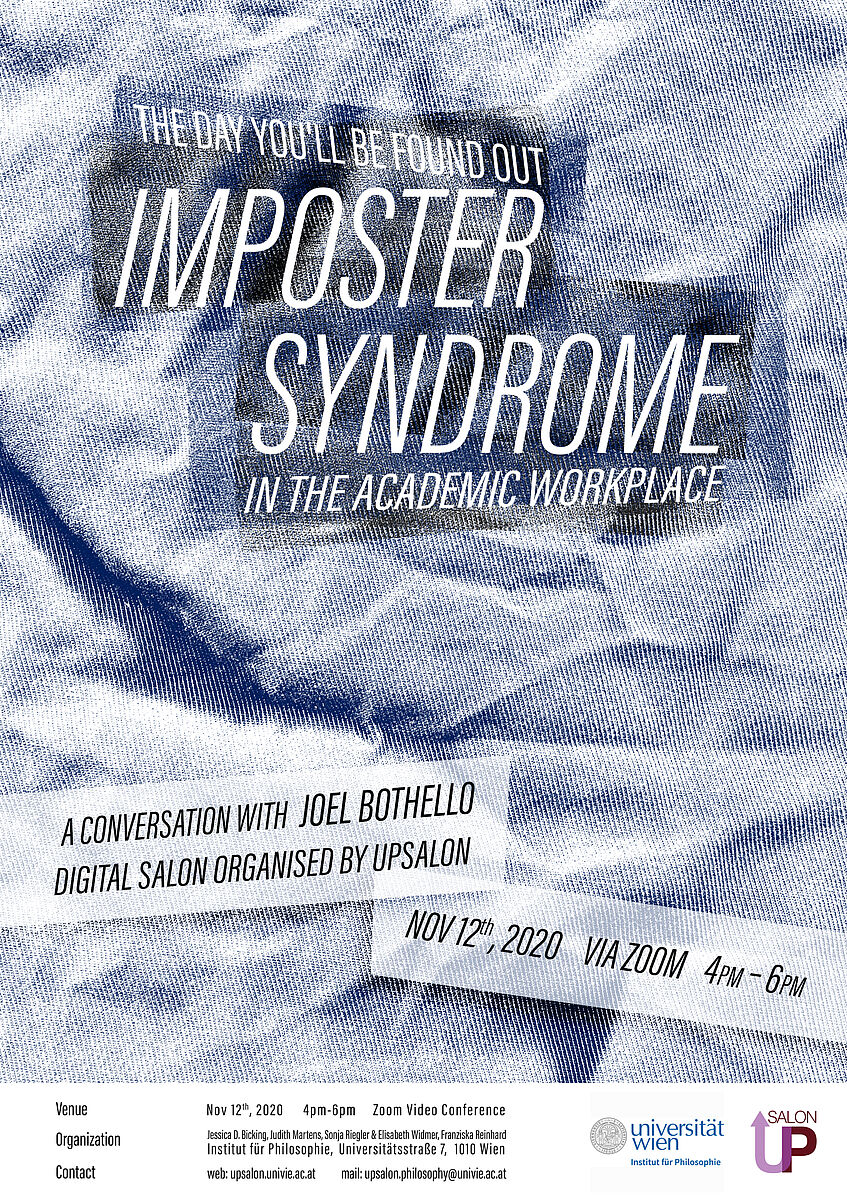
UPsalon #2:
The Day You'll be found out - Imposter Syndrome in the Academic Workplace
A conversation with Joel Bothello (Concordia University)
When? Thursday, November 12, 2020 - 4 to 6PM (CEST)
Where? ONLINE SALON (Watch the talk on YouTube)
What?
What has given Imposter Syndrome its name is the creeping sense that one's success and accomplishments can be attributed either to luck or are a result of having deceived or tricked others. Accompanied by a persistent internalized fear of being exposed as a "fraud" and despite external evidence of their competence, those experiencing this phenomenon remain convinced that they do not deserve all that they have achieved.
Imposter Syndrome has been recognized to affect both men and women, and has been shown to be related to a "feeling of not belonging". This might render minorities that find themselves underrepresented in their workplace especially vulnerable. Whether on the basis of ethnicity, gender, sexual orientation or socioeconomic status - underrepresentation is an issue that academic philosophy has to come to grips with.
Join us for a conversation with Joel Bothello to discuss Imposter Syndrome and with it explore some of the conditions that may influence the minority philosopher's experience in academia. In an informal setting, we hope to fashion a space where we can share our own experiences, learn to recognize associated patterns and put our heads together on coping strategies or preventive measures in the academic setting.
The link will be shared in due time over the university mailinglists.
If you are not on those mailinglists, please register your interest with an e-mail at upsalon.philosophy@univie.ac.at.
Everybody is welcome!
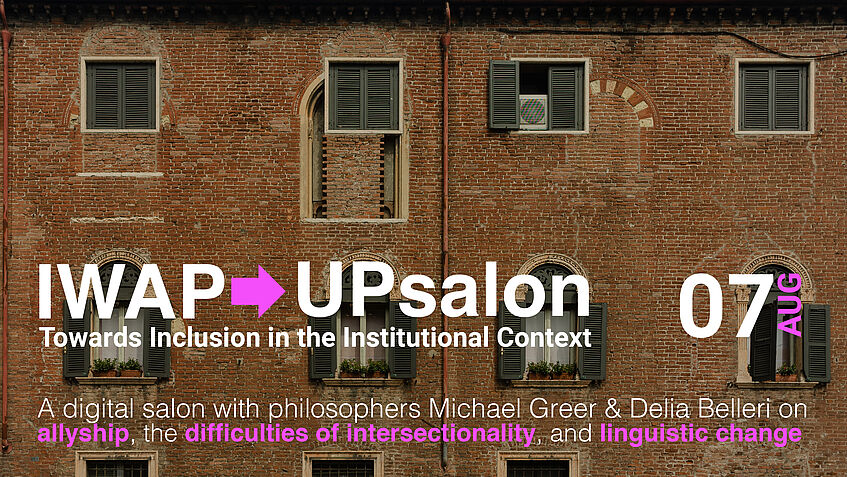
UPsalon #1:
IWAP → UPsalon - Towards Inclusion in the Institutional Context
with Delia Belleri & Michael Greer
When? Friday, August 7, 2020 - 3PM (CEST)
Where? ONLINE SALON
(Zoom webinar link will be shared in due time)
What? We are happy to announce that IWAP is starting into the new semester as UPsalon; a salon for underrepresented philosophers. This is to make more explicit that we wish to be an initiative that is striving to be inclusive without compromise and invite all underrepresented philosophers, such as, but not limited to Women*, Ethnic Minorities, Gender Minorities, the socioeconomically disadvantaged and people disabled by society.
From the comfort of your home, join us for our first digital salon, where we will raise our glasses with philosophers Delia Belleri (UniVie) and Michael Greer (CUNY) to discuss allyship, the difficulties of intersectionality, and linguistic change for inclusion in the institutional context.
Come, engage and think along to help us be better!
The link will be shared in due time over the university mailinglists.
If you are not on those mailinglists, please register your interest with an e-mail at upsalon.philosophy@univie.ac.at.
Also check out the Facebook event page.
Everybody is welcome!

IWAP-Salon #2:
Bystander Training
with Rebekka Hufendiek (SWIP Germany)
INFO: POSTPONED DUE TO COVID-19. DETAILS TO FOLLOW.
When? Wednesday, April 22, 2020 - 4pm
Where? Café Caspar - Grillparzerstraße 6, 1010 Vienna
About the workshop
- Bystander Training assumes that one needs training to be able to behave responsibly and courageously in problematic situations
- is supposed to raise awareness of what such problematic situations are (discrimination at the university)
- meant to provide space for discussion and experimentation with strategies for intervention
During the workshop there will be an introduction and theoretical input. The trainer will create a safe space where we can discuss case studies and enact them. After that there will be a discussion of intervention strategies and the results from the enactment. The evening will be closed with time for reflection and feedback.
The examples we will work with are partly philosophy-related - they are real-life experiences from other philosophers. Cases involve questionable general remarks and remarks targeted at one individual. From classroom situations to dinners at conferences. During the workshop we can practice scenarios and explore how it feels to respond in different ways.
Drinks and snacks can be served and you are more than welcome to stay with us for dinner at the café after the workshop has taken place.
There is limited space, so send an e-mail with your name to save a spot.
Everybody is welcome!
So far, to tread gently for tactical reasons has always proven a mistake.
Johanna Dohnal
IWAP-Salon #1:
Affirmative Action for Women in Philosophy
with Tarja Knuuttila & Elisabeth Holzleithner
When? Monday, October 28, 2019 - 7pm
Where? Café Korb - Brandstätte 7-9, 1010 Vienna
What? A recent report (see also) by the Gender Equality & Diversity Unit of the University of Vienna paints a clear picture: Women remain conspicuously underrepresented in the higher ranks of academia. In philosophy especially, the percentage of women drops dramatically on the way up the ladder. A worrying status quo that affirmative action policies are supposed to counteract, but what are the theoretical implications on the one hand and the practical realities on the other?
Join us for a couple of drinks and a conversation with Tarja Knuuttila & Elisabeth Holzleithner on the cans and cannots of affirmative action opposing the glass ceiling, leaky pipelines and gender bias.
Registrations are not required.
There’ll be the opportunity, but no obligation to order drinks & food.
